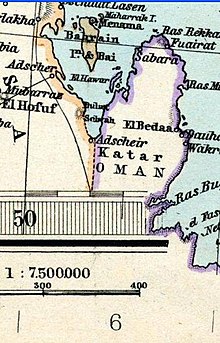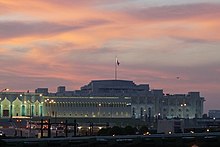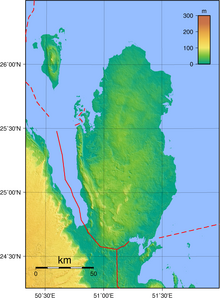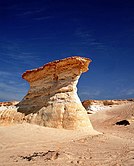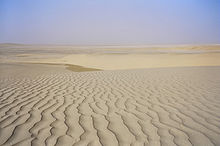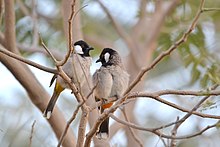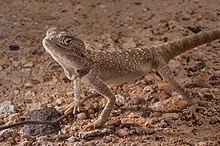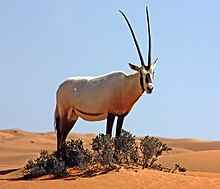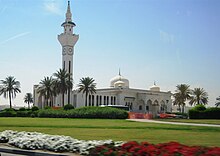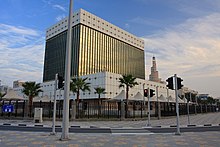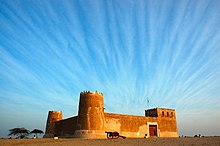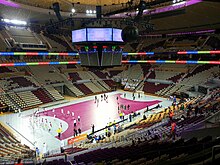Taste
Qatar (in Arabic, قطر, romanized: Qaṭar; AFI: [ˈqɑtˁɑr]; Arabic of the Gulf [ɡɪtˤɑr]), whose official name is State of Qatar (in Arabic, دولة قطر, romanized: Dawlat Qaṭar) is a sovereign state Arab located in western Asia and occupying the small peninsula of the same name in the eastern Arabian peninsula. It has a single land border, to the south with Saudi Arabia, while the rest of the territory is bathed by the waters of the Persian Gulf. A strait of water separates this peninsula from the island state of Bahrain.
Qatar is an absolute monarchy that has been ruled by the Al Thani family since the mid 19th century century. Before the discovery of oil in its territory, it was famous for the collection of pearls and for its maritime trade. It was a British protectorate until it gained independence in 1971. In 1995 Sheikh Hamad al Thani became emir after deposing his father, Khalifa bin Hamad al Thani, in a peaceful coup. Since 2013, the Qatari emir is his son Tamim bin Hamad Al Thani, who took office after his father's abdication.
Qatar has the world's third largest natural gas reserves, which has made the small emirate the country with the highest per capita income on the planet and has led it to achieve the second highest human development index in the Arab world (by behind the United Arab Emirates). Its economy is recognized as high-income by the World Bank and is also ranked 29th most peaceful country globally. Qatar is currently undergoing a major, multi-decade planned transformation that aims to achieve an advanced economy, sustainable and diversified.
In recent times, Qatar has begun to gain weight in the Arab world. The country is extending its global influence through its state television Al Jazeera. The nation maintains very close relations with various Western and Asian powers, and has on numerous occasions acted as a bridge between Muslim states and the rest of the world. Qatar has a population of more than two million people, but only two hundred and fifty thousand of them are Qatari citizens. Most of its inhabitants are foreigners who work and live there. In addition, it is one of the few countries whose citizens do not pay any taxes.
In June 2017, Saudi Arabia, Bahrain, Egypt and the United Arab Emirates, among other Muslim states, severed diplomatic relations with the country and imposed a blockade, allegedly accusing it of supporting and financing terrorism, as well as manipulating the internal affairs of its neighboring states, as a result of a long-standing escalation of tensions with Saudi Arabia. However, in January 2021 and under the mediation of Kuwait and the United States, Qatar and Saudi Arabia agreed to end the blockade, reopening their borders and starting a reconciliation process between Riyadh and Doha. In order to promote tourism, Qatar has invested billions of dollars in infrastructure improvements, has hosted the 2006 Asian Games and the 2022 Soccer World Cup, the first Arab country to do so. It will also host the 2030 Asian Games.
Toponymy
Gaius Plinius, a Roman writer, documented the first account pertaining to the inhabitants of the peninsula in the mid-century I, referring to them as the Catharrei, a designation that may have derived from the name of an important local settlement. A century later, Ptolemy produced the first known map to depict the peninsula, referring to it as Catara. The map it also referred to a town called Cadara to the east of the peninsula. The term "Catara" (inhabitants, Cataraei) was used exclusively until the 19th century XVIII, after which "Katara" emerged as the most commonly recognized spelling. Eventually, after variations—"Katr", "Kattar", and "Guttur"—the modern derivative Qatar was adopted as the spelling. country name.
In 2010, the Royal Spanish Academy in the innovations established in the Spelling of said year, recommended the use of the spelling «Catar» instead of the transcription «Qatar» obtained «from the Arabic originals that present a use of the & #39;q' foreign to the orthographic system of Spanish".
History
The first historical inhabitants of Qatar were the Canaanites. Islam arrived in the 7th century century and brought Qatar successively into the Umayyad and Abbasid caliphates. Qatar was an important stopover on the route from Basra to Oman in the Middle Ages. It was also an important pirate nest until almost the 19th century.
From the 18th century the Ottoman Empire began to take an interest in the area. After the Al Khalifa family immigrated to Qatar from Kuwait, the Iranians invaded the peninsula in 1783 but were driven out soon after. The Al Khalifa established themselves on the nearby island of Bahrain, from where they served as the ruling family in Bahrain and Qatar, but the Qataris rebelled against their sovereignty in 1867. Aided by the ruler of Abu Dhabi, the Al Khalifa defeated the inhabitants of Qatar and razed the city of Doha.
The intervention of the British to reduce piracy in the region allowed the Al Thani family to come to power in Qatar. Qatar was then subjugated by the Ottoman Turks in 1871, and the peninsula came under the authority of the Ottoman Governor of Basra. But a victorious uprising by the Qataris in 1893 reduced Turkish influence in the country.
For many centuries, Qatar was in the hands of the Persians. Later, it would become part of the Ottoman Empire, until its dismemberment in 1915. The emir 'Abd Allāh signed a treaty with the United Kingdom (1916), thanks to which the emirate became a British protectorate.
Following the British decision to leave the Persian Gulf in 1971, Qatar joined the Federation of Arab Emirates of the Persian Gulf (1968). Obtained independence (1971), withdrew from the Federation, signed a friendship treaty with the British and joined the Arab League and the UN (1971).
With a bloodless coup (1972), Ahmed Al Thani was deposed by his cousin Sheikh Khalifa Al Thani, who remained in power until 1995, when he was dethroned by his son Hamad Al Thani, while he was passing the vacation in Switzerland. As of 2013, Sheikh Tamim bin Hamad Al Thani (Arabic: الشيخ تميم بن حمد آل ثاني; born June 3, 1980) is the current Emir of Qatar, as a result of the fact that in June 2013 his father, the aforementioned Hamad Al Thani, announced his willingness to abdicate in Tamim before members of the royal family and prominent figures of Qatari society.
In March 2005, a British teacher was killed by a suicide bomber in what turned out to be the first act of terrorism in the country. The suicide attack was carried out by Egyptian citizen Omar Ahmed Abdullah Ali, a resident of Qatar and suspected of connections to Al-Qaeda.
On June 5, 2017, the governments of Egypt, Saudi Arabia, the United Arab Emirates, Bahrain, Yemen, Libya and the Maldives severed diplomatic relations with Qatar amid growing tension generated by Qatar's alleged interference in the situation of these countries and the alleged support for the Yemeni Houthis facing the invasion of Saudi Arabia. The crisis ended on January 5, 2021 with an agreement formed at the Gulf Cooperation Council Summit in Al-Ula.
Government and politics
Qatar is an emirate. Under the 1970 Constitution, executive power rests with the Council of Ministers. The Majlis al-Shura (Consultative Assembly) has consultative powers. On April 29, 2003, Qatar held a referendum to approve a new Constitution that was supported by 98.4% of the voters. It entered into force in 2005. It provides for the election of a 45-member Consultative Assembly (of which 15 are appointed by the emir) who will be able to propose the adoption of laws, approve and amend the budget, carry out debates on government policy and ask questions of ministers. The Constitution does not provide for the creation of political parties, but it does recognize the right to freedom of expression and association, the right to a fair trial, and enshrines freedom of worship.
The Cooperation Council for the Arab States of the Persian Gulf, created in 1981 as a reaction to the supposed threat of the Iranian Revolution, is made up of Saudi Arabia, Bahrain, the United Arab Emirates, Kuwait, Qatar and Oman. The objective is to promote economic cooperation between member countries and improve joint work in terms of common foreign and security policy. The member countries also seek to create a monetary union. All this partly following the model of the European Union.
Internal Policy
The Qatari government maintains a series of restrictions on freedom of expression and equality movements.
In Qatar, the ruling Al Thani (آل ثاني) family has held sole power since the country's independence in 1971. The Emir, who is the head of state, runs the country with the support of his family.
In 1971, the Basic Laws of Qatar institutionalized local customs rooted in Qatar's conservative Wahhabi heritage (its influence has diminished today), giving the Emir considerable power. The maintenance of the traditions of consultation, managed by consensus, and the right of the citizen to appeal to the emir personally, influence the role of the emir. The emir, although not subject to any individual, cannot violate sharia (Islamic law) and in practice must take into account the opinions of notable leaders and religious authority. The Consultative Council, a group with appointed members that assists the Emir in developing new policies, institutionalizes the position of such influential groups. It is a country without political parties and its formation is explicitly prohibited in its legal system.
In February 1972, Prime Minister Khalifa bin Hamad Al Thani deposed his cousin, Emir Ahmad bin Ali Al Thani, and assumed all powers. Leading members of the Al-Thani family supported his decision, which was carried out without any violence or signs of political turmoil.
On June 27, 1995, Prime Minister Hamad bin Khalifa Al Thani ousted his father, Emir Khalifa, without violence, and made it his goal to raise Qatar's profile on the regional scene and, in as far as possible, internationally. Emir Hamad and his father reconciled in 1996, but the ousted ruler did not return to the country until 2004, after spending time in France and Italy. Freedom of the press has been expanded, and the Qatari television network Al Jazeera has earned a unique reputation as a source of 'free and uncensored information' in the United States. in the Arab countries. The first local council elections, open to all adults, including women, were held in 1999, and in April 2003 the country adopted a constitution that took four years to write. Its main novelty: the institution of a Majlis Al-Shura (consultative council) of which thirty of the forty-five members will be elected by direct universal suffrage, the remaining fifteen being designated exclusively by the Emir (article 77). The first election of this parliament took place in 2004. However, the new Constitution does not allow the formation of political parties. One of the most innovative articles is the one that guarantees religious freedom, without restricting it to monotheistic religions. During the war against Iraq, the country served as a base for United States military personnel (the United States Central Command in Tampa, Florida, CENTCOM, responsible for war operations in Iraq).
On December 11, 2002, a military cooperation agreement was signed with the United States regarding the use of Al-Eideid airbase by US forces. In 2011, Qatar sent its Mirage aircraft to fight against the Libyan forces of Muammar Gaddafi together with the Western troops, leaving the field of mediation for that of action.
After gradually preparing his succession for two years by involving him in the most important issues, the emir Hamad ben Khalifa Al Thani, in failing health, abdicated on June 25, 2013 in favor of his son Tamim ben Hamad Al Thani who, at 33, became the youngest head of state in the Arab world.
Human Rights
In terms of human rights, regarding membership of the seven bodies of the International Bill of Human Rights, which include the Human Rights Committee (HRC), Qatar has signed or ratified:
Since 2014, some provisions of the Qatari Penal Code allow punishments such as flogging and stoning to be imposed as criminal sanctions. The UN Committee against Torture considered that these practices constituted a breach of the obligations imposed by the UN Convention against Torture. Qatar maintains the death penalty, mainly for threats against national security, such as terrorism. The use of the death penalty is rare and there have been no state executions in Qatar since 2003. In Qatar, homosexual acts are illegal and may be punishable by death.
A 2011 report by the US State Department found that some expatriate workers from nations across Asia and parts of Africa who voluntarily immigrated to Qatar as low-skilled laborers or domestic servants later faced conditions suggestive of involuntary servitude. Some of the most common violations of labor rights are beatings, withholding pay, charging workers for benefits for which the employer is responsible, restrictions on freedom of movement (such as confiscation of passports, identity documents, travel or exit permits), arbitrary detention, threats of legal action, and sexual assault. Many migrant workers arriving to work in Qatar have paid exorbitant fees to recruiters in their home countries.
Legal system
In contrast to other Arab states (like Saudi Arabia, for example), Qatar has some of the most relatively liberal legislation among the Muslim community, but it does not go to the extremes of other Gulf Arab nations (like the United Arab Emirates). United States or Bahrain). Qatar is a continental law jurisdiction; however, Sharia applies to aspects such as family, inheritance and some criminal acts. Women can legally drive in Qatar, and there is a nascent emphasis on equality and human rights, formally evidenced at least since the establishment of the Qatar National Human Rights Committee. However, raped women are convicted of adultery.
The country is undergoing a period of liberalization and modernization that began in the reign of Emir Hamad Al Thani, and is continued by the current Emir Tamim bin Hamad Al Thani. Qatari laws tolerate alcohol up to a certain amount. However, public bars and nightclubs only operate in expensive hotels and clubs. Expatriate residents of Qatar are eligible to receive alcohol permits, thus allowing them to pay for alcohol for personal use through the Qatar Distribution Company, the exclusive importer and seller of alcohol in Qatar. Qatar has started to liberate itself during the 15th edition of the Asian Games, but they are careful not to be too liberal in their laws.
Like other Gulf Arab countries, Qatar had endorsement laws. These laws were widely described as resembling modern slavery. The system of guarantees ("kafeel" or "kafala") says that a person intending to settle for work cannot enter the country without a "kafeel" nor can they leave without his permission, signed with the guarantor or "kafeel".
Since December 13, 2016, Qatar abolished the "kafala" guarantee system, following complaints from international organizations about abuses of workers' rights.
Foreign Relations
Qatar's international profile and active role in international affairs has led some analysts to identify it as a middle power. Qatar was an early member of OPEC and a founding member of the Gulf Cooperation Council (GCC). He is a member of the Arab League. Qatar's diplomatic missions are based in its capital, Doha.
Regional relations and Qatar's foreign policy are characterized by a strategy of balance and alliance-building among the major regional powers. It maintains an independent foreign policy and participates in the regional balance to ensure its strategic priorities and gain regional and international recognition. As a small Gulf state, Qatar established an "open door" in which Qatar maintains ties with all regional parties and actors in the region, including with organizations such as the Taliban and Hamas. The history of Qatar's alliances provides insight into the basis of its foreign relations. Between 1760 and 1971, Qatar sought formal protection from the transitory high powers of the Ottomans, the British, the Al-Khalifas of Bahrain, and Saudi Arabia.
Qatar has especially strong ties to China, Iran, Turkey, and the United States, as well as various Islamist movements in the Middle East, such as the Muslim Brotherhood. As of June 2017, Saudi Arabia, the UAE, Bahrain, Egypt and Yemen severed their diplomatic ties with Qatar, accusing it of allegedly supporting terrorism. The crisis intensified a dispute over Qatar's support for the Muslim Brotherhood, which is considered a radical organization by some Arab nations. The diplomatic conflict it ended in January 2021 with the signing of the AlUla declaration.
In 2011, Qatar supported the Arab Spring revolutions. In Syria, Egypt, Libya and Tunisia, it mainly supported movements linked to the Muslim Brotherhood. This support, however, led to strong tensions with Saudi Arabia and United Arab Emirates, which is very hostile to these movements. On the other hand, Qatar supports the repression of the popular revolts in Bahrain. This apparent contradiction is explained by the confessional reading that underlies Qatar's geopolitics. Qatar supports Sunni Muslim revolutions and the suppression of Shiite Muslim revolts.
In Syria, Qatar, which had previously maintained cordial relations with the dictatorship in Syria, only switched to supporting the opposition after several weeks. As in other countries, it openly supports the Muslim Brotherhood. It financed many rebel groups, as well as as the National Coalition of Revolutionary and Opposition Forces (NCOR). However, the Qataris were withdrawn from CNFOR in 2013, following the election of the Saudi-backed Ahmad Jarba. In September 2014, Qatar joined the international coalition against the Islamic State.
Defense
The Qatar Armed Forces are the country's military forces. The country maintains a modest military force of approximately 11,800 men, including an army (8,500), a navy (1,800) and an air force (1,500). Qatar's defense spending accounted for approximately 4.2% of gross national product in 1993, and 1.5% of gross domestic product in 2010, the most recent year available in the SIPRI statistical database. Qatar has signed recent defense pacts with the United States and the United Kingdom, as well as with France in early 1994. Qatar plays an active role in the Gulf Cooperation Council's collective defense efforts; the other five members are Saudi Arabia, Kuwait, Bahrain, the United Arab Emirates, and Oman. The presence of the large Al Udeid airbase, run by the United States and several other UN nations, provides a guaranteed source of national defense and security. In 2008, Qatar spent $2.3 billion on military spending, 2.3% of gross domestic product. Qatari special forces have been trained by France and other Western countries, and are believed to possess considerable skill. They also helped to Libyan rebels during the 2011 Battle of Tripoli.
The Stockholm International Peace Research Institute (SIPRI) reported that in 2010-14 Qatar was the 46th largest arms importer in the world. SIPRI writes that Qatar's plans to significantly transform and expand its armed forces have been accelerated. Orders placed in 2013 for 62 tanks and 24 self-propelled guns from Germany were followed in 2014 by other contracts, including 24 combat helicopters and 3 early warning and control aircraft to the United States, and 2 tanker aircraft to Spain. In 2015, Qatar was the 16th largest arms importer in the world, and in 2016, the 11th, according to SIPRI.
The Qatari army participated in the Saudi-led intervention in Yemen against the Shiite Houthis. In 2015, Al Jazeera America reported: "Numerous reports suggest that the Saudi-led coalition against opposition groups in Yemen has indiscriminately attacked civilians and used cluster bombs in areas populated by civilians, violating the right International." Many civilians have been killed and much of the infrastructure in this region is destroyed. Hospitals have also been bombed by the Saudis and those who operate with them. Qatar was suspended from the coalition in Yemen due to the 2017 Qatari diplomatic crisis.
Territorial organization
The state of Qatar is territorially organized into eight municipalities (baladiyah). The last time a significant change was made was in 2004 when the ten existing municipalities at that time were reduced to seven at first, in 2015 a new municipality was created for which the number of municipalities rose to eight.
|
|
|
|
Geography
Qatar occupies a narrow peninsula that juts 150km into the Persian Gulf from Saudi Arabia, plus a few offshore islands. Much of the country is a low, barren plain covered with sand. To the southeast is the Khor al Adaid (or 'inland sea'), an area of shifting sand dunes surrounding a gulf bay.
Qatar's highest point is at Jebel Dukhan to the west, a series of low limestone outcrops running south to north from Zikrit through Umm Bab to the southern border, reaching about 90 meters above sea level. The main internal oil deposits of Qatar are also found in this area, while the natural gas deposits are in the sea, to the northwest of the peninsula.
The territory occupies 11,586 km², an area similar to that of the island of Jamaica.
Ecology
Within the desert biome that covers the entire territory of Qatar, the World Wide Fund for Nature (WWF) distinguishes two ecoregions: the desert and semi-desert of the Persian Gulf, on the coast, and the desert and xerophilous forest of Arabia and Sinai, inside and in the hydrogenation space.
World Bank statistics rank Qatar as the country with the most CO2 emissions per capita in the world, by far. In 2011, each Qatari resident produced an average of 31 tons of carbon dioxide (CO2) per year (by comparison, the United States had an average of 17.7 tons, China an average of 7.2 tons, and Germany an average of 7.9 tons of CO2 per capita per year; Qatar's total emissions were roughly equivalent to those of Berlin and Hamburg together, with about half the population). The emirate of Qatar has rich deposits of natural gas and oil, the burning of which is partly responsible for global warming. The 2012 UN Climate Change Conference was held in Doha. The 2012 UN Climate Change Conference in the country with the highest CO2 emissions per capita in the world starkly illustrates the renewed failure of the global climate protection policy, according to the "Emissions Gap Report 2012" of the United Nations Environment Program (UNEP).
Topography
Marshes and strips of desert separate Qatar from the rest of the Arabian peninsula. The salt flats - called sabchas - at sea level are relics from the time when Qatar was still an island. Only a slight elevation of the terrain created the connection with the Arab mainland. From these marshes, the area of gently rolling hills characteristic of the whole of Qatar rises to the north. The highest point in Qatar is Mount Qurain Abu l-Baul, at 103 m, in the south of the country.
The terrain, predominantly flat, is characterized by a desert of scree and gravel. Sand dunes only occur sporadically, especially on the far southeast coast. The coast is divided by several elongated bays. There are numerous coral reefs on the coast, especially in the eastern part. Groundwater has a high salt content; drinking water is produced in seawater desalination plants. In the southeast is the marine lagoon of Chaur al-Udaid.
Climate
With a low annual rainfall of less than 100mm, Qatar is one of the driest landscapes on the planet. Due to its proximity to the Persian Gulf, the climate is humid, subtropical and hot throughout the year. Humidity ranges from 40% to 70%, depending on the month. In summer, temperatures of 45 °C are not uncommon, while in winter they drop to an average of 17 °C. However, temperatures below 10 °C have been more frequent, especially in recent winters. Often dry and dusty wind blows from the northwest.
The long summer (from June to September) is characterized by intense heat and alternating dryness and humidity, with temperatures exceeding 40 °C. Temperatures are moderate from November to March, ranging from 39 °C in April and 7 °C in January.
When it comes to natural disasters, such as volcanic eruptions, hurricanes, earthquakes, droughts, and rising sea levels, Qatar is considered one of the safest countries in the world. In the 2021 Global Risk Report, it was the country with the lowest catastrophe risk among 181 countries assessed.
Poor rainfall and limited groundwater, most of which has such a high mineral content that it is unfit for drinking or irrigation, restricted the population and the degree of agricultural and industrial development that the country could endure until desalination projects began. Although water continues to come from underground sources, most of it is obtained by desalination of seawater.
| Month | Ene. | Feb. | Mar. | Open up. | May. | Jun. | Jul. | Ago. | Sep. | Oct. | Nov. | Dec. | Annual |
|---|---|---|---|---|---|---|---|---|---|---|---|---|---|
| Average temperature (°C) | 22 | 23 | 27 | 33 | 39 | 42 | 42 | 42 | 39 | 35 | 30 | 25 | 33.3 |
| Temp. medium (°C) | 14 | 15 | 17 | 21 | 27 | 29 | 31 | 31 | 29 | 25 | 21 | 16 | 23 |
| Total precipitation (mm) | 12.7 | 17.8 | 15.2 | 7.6 | 2.5 | 0 | 0 | 0 | 0 | 0 | 2.5 | 12.7 | 71 |
| Source: http://us.worldweatheronline.com/doha-weather-averages/ad-dawhah/qa.aspx | |||||||||||||
Wildlife
Qatar is a peninsula located on the northeast coast of the Arabian Peninsula, bordered by Saudi Arabia to the south and surrounded by the Persian Gulf. A strait separates Qatar from the island kingdom of Bahrain.
Al Wabra Wildlife Reserve was created to support various species and is also a site for breeding programmes. Among the species in the reserve are: Spix's Macaw, Beira Antelope, Golden-headed Lion Tamarin, Dibatag, Encephalartos, Sudanese Cheetah and the North African Ostrich.
The animals of Qatar include Asiatic jackals, Cape hares, caracals, desert hedgehogs, red foxes, sand cats, striped hyenas, Arabian sand gazelles, and Wagner's gerbils. Among the introduced species is the dromedary; the Arabian oryx has been reintroduced. Habitat includes arid and semi-arid desert, sand dunes, beaches, and mangroves.
More than 80 gamblers inhabit the mountainous landscape of Halul Island, which has expanded from a group of six individuals first transported to the island in 1963.
Marine habitats include coral reefs, tidal marshes, mangroves, and kelp beds. Among the marine species are molluscs, as well as more than 500 species of fish, the most common being black snapper, sea bream and angel fish. Other species include carangids, emperors, snappers, and sweetlips, as well as barracuda, goatfish, groupers, lizardfish, rabbitfish, sharks, rays, and threadfin. There are also Chinese white dolphins, gray dolphins, and black finless porpoises.
Dugongs are known to congregate along the country's coastlines. During a survey carried out in 1986 and 1999 in the Persian Gulf, the largest group in history, with more than 600 individuals, was sighted west of Qatar.
Flora
The flora of Qatar includes more than 300 species of wild plants. Qatar occupies a small desert peninsula about 80 km from east to west and 160 km from north to south. The climate is hot and humid with sporadic rainfall. Most of the country is flat, with an average annual rainfall of less than 3 inches. The yellow Arnebia hispidissim flowers annually on sandy soils. Glossonema edule has edible fruits with yellow-brown flowers.
Vegetation is very sparse in the hamada landscape due to heavily eroded soil. A native species of tree, Vachellia tortilis (known locally as samr). It is well adapted to the desert environment and is one of the most common forms of vegetation in the country. Tetraena qatarensis and Lycium shawii also grow in this landscape.
Shallow depressions called rawdat provide a more varied selection of plants, as rainwater is more likely to collect. The Ziziphus nummularia is found in deeper soil, while the grass Cymbopogon parkeri is found in shallower soil. In the south of the peninsula, where groundwater is scarce, Panicum turgidum and V. tortilis grow in soils blown by the wind. The plant distribution in the south is concentrated mainly in the rawdas and wadi fed by the runoff from nearby hills.
Protected areas
Protected areas of Qatar include:
- The Al Reem Biosphere Reserve (designated in 2007) is part of the Arab States World Biosphere Reserve Network.
- Al-Shahaniyah Park in Al-Shahaniya.
- Al Thakira's natural reserve in Al Thakhira.
- Al Wabra Wildlife Conservation Zone.
- Dahl Al Hammam Park, a sink in Doha (the entrance to the sink is now closed to the public).
- Khor Al Adaid Nature Reserve, Khor Al Adaid.
- Fish sanctuary of Khor Al Udaid.
- Mudhlem Cave, Mukaynis.
- Musfer Fosa in Salwa.
- Ras Abrouq Nature Reserve (also known as Bir Zekreet, or Zekreet Beach), in Ras Abrouq.
- Ras Ushairij Gacela Conservation Park.
- Umm Tais National Park.
Demographics
| Year | Population |
|---|---|
| 1908 est. | 26 000-27 000 |
| 1939 est. | 28 000 |
| near 1960 | 70 000 |
| 1986 | 369 079 |
| 1997 | 522 023 |
| 2000 | 744 483 |
| 2001 | 769 152 |
| 2002 | 793 341 |
| 2003 | 817 052 |
| 2004 | 840 290 |
| 2005 | 863 051 |
| 2006 | 885 359 |
| 2007 | 907 229 |
| 2008 | 824 789 |
| 2009 | 1 409 000 |
| 2010 | 1 681 099 |
| 2011 | 1 686 027 |
| 2012 | 1 759 227 |
| 2013 | 1 903 447 |
| 2014 | 2 016 576 |
| 2015 | 224 583 |
| 2016 | 2 423 175 |
| 2017 | 2 576 181 |
Almost all Qataris are Muslim. In addition to the native Arabs, there are many foreigners who work in the country's oil industry. Arabic is the official language, but English is also spoken by a considerable part of the population.
The Qatari population only makes up 20% of the country's inhabitants. Most are foreign workers from India, Iran or North African countries. Western immigrants enjoy a high standard of living but do not participate in the country's politics. The Qataris are supporters of the Wahhabi interpretation of Sunni Islam. However, women are not required to wear a headscarf and have the right to hold a driver's license. Christian immigrants enjoy freedom of worship but are not authorized to promote Christianity.
Since oil exploitation allowed Qatar to become rich, most of the population, previously made up of nomadic Bedouins, has become urban. About 90% of Qataris reside in Doha, the capital, or on its outskirts. This migration has caused the depopulation of the northern towns.
The people of Qatar are descended from the natives of the Arabian peninsula. Many Qataris from various tribes immigrated to Qatar in the 18th century to escape the harsh conditions of neighboring Nejd and the -Hasa. Some descend from the Omani tribes. Qatar has just over two million inhabitants. Foreign workers with temporary residence status make the population grow.
For centuries, the main sources of wealth were fishing, the “cultivation” of pearls and trade. At one time, the Qataris owned almost half of the fishing fleet in the Persian Gulf. With the Great Depression (1929) pearl farming in Qatar declined drastically.
Education is compulsory and free for all residents between the ages of 6 and 16. Qatar has an increasingly high literacy rate.
Religion
Islam is the predominant religion and is professed by 77.5% of the population of Qatar. Sunni Muslims make up 98% of the Muslim population. Most non-citizens are Sunni or Shia Muslims, Christians, Hindus, Buddhists, or Baha'is. Most of the foreign workers and their families live close to the main employment centers of Doha, Jor, Mesaieed and Dukhan.
The Hindu community is almost exclusively Indian, while the Buddhists are from South, Southeast and East Asia. Most of the Baha'is in the region come from Iran. Religion is not a criterion for citizenship, according to the Nationality Law. However, almost all of Qatar's citizens are Sunni or Shia Muslims, with the exception of Christians, Baha'is and their respective families who were granted Qatari citizenship.
There are no foreign missionary groups operating openly in the country, but in 2008 the government allowed some churches to celebrate mass. In March 2008, the Catholic Cathedral of Our Lady of the Rosary was consecrated in Doha.
In general, there are no problems of coexistence with religious minorities.
Health
The level of health care in Qatar is generally high. Qatari citizens are covered by a national health insurance plan, while expatriates must receive health insurance from their employers or, in the case of the self-employed, purchase insurance. Qatar's healthcare spending is one of the most Middle East, with $4.7 billion invested in healthcare in 2014. The country's largest healthcare provider is the government-created Hamad Medical Corporation as a non-profit healthcare provider, which operates a network of hospitals, an ambulance service and a home health care service, all accredited by the Joint Commission.
In 2010, health spending represented 2.2% of the country's GDP; the highest in the Middle East. In 2006, there were 23.12 doctors and 61.81 nurses per 10,000 population. Life expectancy at birth was 82.08 years in 2014, or 83.27 years for for men and 77.95 years for women, making it the longest life expectancy in the Middle East. Qatar has a low infant mortality rate of 7 per 100,000.
In 2006, there were a total of 25 beds per 10,000 people, and 27.6 doctors and 73.8 nurses per 10,000. In 2011, the number of beds decreased to 12 per 10,000 people, while the number of doctors increased to 28 per 10,000 people. Although the country has one of the lowest hospital bed ratios in the region, physician availability is the highest in the GCC.
Education
Qatar contracted with the RAND Corporation to reform its K-12 education system. Through the Qatar Foundation, the country has built Education City, a campus that houses local branches of Weill Cornell Medical College, the of Computer Science, Georgetown University School of Foreign Service, Northwestern's Medill School of Journalism, Texas A&M School of Engineering, University of Virginia School of the Arts, and other Western institutions.
The illiteracy rate in Qatar was 3.1% for men and 4.2% for women in 2012, the lowest in the Arabic-speaking world, but 86th in the world. Citizens are required to attend government-provided education from kindergarten to high school. Qatar University, founded in 1973, is the oldest and largest institution of higher learning in the country.
In November 2002, Emir Hamad bin Khalifa Al Thani created the Supreme Council of Education, which directs and controls education for all ages, from pre-school to university level, including the "Education Initiative. for a new era", which was established to try to establish Qatar as a leader in education reform. According to the Webometrics ranking of world universities, the best universities in the country are the University of Qatar (1,881st worldwide), Texas A&M University Qatar (3,905th) and Weill Cornell Medical College Qatar (6,855th).
In 2009, Qatar established the Qatar Science and Technology Park in Education City to link these universities with industry. Education City is also home to a fully accredited International Baccalaureate school, Qatar Academy. In addition, two Canadian institutions, the College of the North Atlantic (based in Newfoundland and Labrador) and the University of Calgary, have opened campuses in Doha. Other for-profit universities have also established campuses in the city.
In 2012, Qatar ranked third from the bottom of the 65 OECD countries that participated in the PISA test of mathematics, reading and skills for 15- and 16-year-olds, comparable to Colombia or Albania, despite having the highest per capita income in the world for that year. Qatar ranked 48th in the Global Innovation Index in 2021, up from 65th in 2019.
As part of its national development strategy, Qatar has drawn up a 10-year strategic plan to improve the level of education. The government has launched educational outreach programs such as Al-Bairaq. Al-Bairaq was launched in 2010 with the aim of offering secondary school students the opportunity to experience a research environment at the Center for Advanced Materials at Qatar University. The program spans the STEM and language fields.
Launched in 2006 as part of an initiative of the quasi-governmental Qatar Foundation, the National Research Fund of Qatar was created with the intention of securing public funding for scientific research in the country. The fund works as a means for Qatar to diversify its economy from being primarily based on oil and gas to a knowledge-based economy.
Qatar Science and Technology Park (QSTP) was created by the Qatar Foundation in March 2009 in an attempt to help the country transition to a knowledge economy. With an initial capital of US$800 million and Initially hosting 21 organizations, the QSTP became Qatar's first free trade zone.
Languages
Arabic is the official language of Qatar, with Qatari Arabic being the local dialect. Qatari Sign Language is the language of the deaf community. English is commonly used as a second language, and is a lingua franca on the rise, especially in commerce, to the point that steps are being taken to try to preserve Arabic from the so-called invasion of English. English is especially useful for communicating with the large expat community in Qatar. In the medical community, and in situations such as training nurses to work in Qatar, English acts as the lingua franca. Reflecting the multicultural composition of the country, many other languages are also spoken, including Persian, Baluchi, Brahui, Hindi, Malayalam, Urdu, Pashto, Kannada, Tamil, Telugu, Nepali, Sinhalese, Bengali, Tagalog, Tulu and Indonesian.
In 2012, Qatar joined the French-speaking international organization of la Francophonie (OIF) as a new associate member, but in December 2013, the French daily Le Monde revealed that Qatar, which has very few native francophones, had yet to pay any contributions to the OIF, while the outgoing OIF administrator complained in 2015 that Qatar had failed to keep any of the promises it made when it joined the organization and had never paid its dues annual.
Economy
Before the discovery of oil, Qatar's economy was centered on fishing and pearl collecting. Due to its precarious and weak economy, Qatar was forced to punch different foreign coins to allow circulation throughout the region during the 19th century XVIII and early XIX. The coins bore a circular mark containing a goat and the Arabic inscription of the country's name. Spanish, French, Austrian, and Indian rupee pieces are known with this strange marking. However, the discovery of oil reserves in the 1940s completely transformed the nation's economy. Now the country has a high standard of living, with many social services for its citizens and all the comforts of any modern nation.
Oil
Qatar's national income is derived primarily from exports of oil and natural gas. The country's oil reserves are estimated at 15 billion barrels (2.4 km³), which should last at least 37 more years. Estimated natural gas reserves are almost 26 trillion cubic meters, approximately 14% of the world total and the third largest in the world. The wealth and standard of living of the Qataris are comparable to those of Western European nations. Qatar has the highest GDP per capita in the world.
Qatar has experienced rapid economic growth in recent years, mainly due to the high price of oil and its derivatives. In 2008 it registered the eighth consecutive budget surplus. The economic policy focuses on the development of activities not associated with the exploitation of hydrocarbon reserves, in addition to promoting and increasing private and foreign investment in non-energy sectors. Despite this, oil and gas are still responsible for more than 50% of GDP, approximately 85% of export earnings, and 70% of state revenue.
Qatar has contemplated the possibility of building a Transrapid train connection that spans the Persian Gulf.
When oil was discovered at Jabal Dhukan in 1938, Qatar was presented with the opportunity for a new source of income to offset losses caused by the collapse of the pearl trade. Commercial production began only a year later, but due to World War II, Qatari oil did not leave the country until 1949. An oil boom followed. In 1961, Qatar joined OPEC. the nation was vastly modernized and, as it were, catapulted from the Middle Ages straight into the modern era, accompanied by social upheaval. Guest workers came to the country mainly from Pakistan, Sri Lanka, Nepal and the Philippines, numbering some 600,000 people to date. The population grew enormously as a result, and now the number of foreigners in the country far exceeds the number of locals. In 1972, the state took over the oil companies. Thus, Qatar was the first small oil-producing country in the Gulf to have one hundred percent of its own reserves. Rising oil prices also made Qatar increasingly wealthy and ensured a very high per capita income. Qatar is one of the countries that are in the so-called strategic ellipse.
Manpower
Until 2016, migrant workers are subject to “kafala”. This can be similar to a subjection in which the employee has no rights, being under the supervision of a "godfather", usually her employer. International media coverage of harsh working conditions on construction sites, especially stadiums being built for the 2022 Soccer World Cup, prompted the emirate to undertake some reforms. The "kafala" is officially abolished and the continuation of work is prohibited when the temperature exceeds forty degrees. However, unions are still banned, the Ministry of Labor has few inspectors to enforce the law, and the penalties (a 400-euro fine) are not very dissuasive. Employees can hardly risk taking their cases to court; a housekeeper who reported abuse could easily be deported.
Egyptian lawyer Adnan Fayçal points out that “Catar, like its neighbours, is more sensitive to the laws of the Anglo-Saxon world. The State is a simple arbitrator, a regulator of relations within the company. In the absence of unions, which are prohibited, it is a paradise for employers."
Qatar Investment Authority
Qatar strives to invest revenue from the oil and gas business in a diversified manner in international holdings. To do this, the Qatar Investment Authority (QIA) sovereign wealth fund was created in 2005, with a share capital of several hundred billion dollars (in April 2017: 335 billion dollars). The volume of the fund already exceeds, therefore, the real economic output of Qatar.
In early June 2009, for example, discussions were held that led to an equity investment from the fund in Porsche AG. In early December 2010 it became known that the QIA was seeking a stake in Hochtief AG, which would counter the threat of a takeover by the Spanish construction group Grupo ACS. These investments are highly desirable because these funds typically do not intend to influence operating activity, but are only looking for a long-term capital investment. An example of this type of equity investment is QIA's five percent stake in French environmental services provider Veolia Environnement, acquired in April 2010.
Qatar Holding, which is part of the company, owned 10% of the common shares of Porsche Automobil Holding from mid-2009 to June 2013.
On June 8-9, 2011, Qatar agreed a strategic partnership with Luxembourg, the first of which focused on the aviation (Cargolux), satellite services (SES Astra) and banking sectors. As part of the implementation of this deal, Precision Capital S.A. bought a stake in Qatar, whose board of directors includes members of Qatar's ruling family, bought the Luxembourg private banking subsidiary KBL European Private Bankers from the Belgian banking group KBC for €1.05 billion. The same financial group acquired Dexia's Luxembourg subsidiary, Dexia-BIL, which was valued at €730 million at the time of the transaction, and the Luxembourg State took a 10% stake in the capital.
In 2016, QIA acquired a stake in Rosneft. As of September 2017, the stake was still 4.7% after QIA, together with Glencore, sold a 14.2% stake to CEFC China Energy Company Ltd. Stake in Hapag-Lloyd is reported to be 14.4% as of August 2017.
QIA holds a 5.21% stake in Credit Suisse as of 2019.
Tourism
The Qatar Tourism Authority is an agency under the Government of Qatar responsible for formulating and managing the rules, regulations and laws governing the development and promotion of tourism in the country.
The Ministry is responsible for tourist attractions and accommodation for travelers and aims to develop and diversify Qatar's tourism sector, as well as increase the contribution of tourism to the country's GDP, future growth and social development.
QTA's activities are guided by the Qatar National Tourism Sector Strategy 2030 (QNTSS), released in February 2014 as a blueprint for the future development of the sector.
Qatar is one of the fastest growing countries in the field of tourism. According to the World Tourism Ranking, more than 2.3 million international tourists visited Qatar in 2017. Qatar has become one of the most open countries in the Middle East thanks to its recent improvements in visa facilitation, including includes the possibility for nationals of 88 countries to enter without a visa and free of charge.
Some tourist sites include:
Al Khor Island, also known as Jazirat bin Ghanim and Purple Island, is an island located in the municipality of Al Khor, on the northeast coast of Qatar. It houses the only archaeological site in the country attributable to the second millennium BC. C. There are four main periods of occupation on the island, dating from ca. 2000 B.C. c. to c. 1900. The island is best known for being the site of the operation of a Kassite-controlled purple dye industry in the 2nd millennium BCE. C.
Zubarah an ancient ruined fort located on the northwest coast of the Qatar peninsula, in the municipality of Al Shamal, about 105 km from the Qatari capital, Doha. It was founded by Sheikh Muhammed bin Khalifa, founding father of the Al Khalifa royal family of Bahrain, the main and most important tribe of the Utub in the first half of the century XVIII. It was designated a UNESCO World Heritage Site in 2013.
Umm Al Maa an archaeological site in northwestern Qatar located in the municipality of Khor, near the border with Al Shamal. Ruwayda is a ruined city located in northern Qatar. Stretching 2.5 km along the coast, it is one of the largest archaeological sites in Qatar and contains its largest fortress.
Qatar also has a series of historical fortifications, among which the Al Khor Towers, the Al Wajbah Fort, the Al Zubara Fort, the Ar Rakiyat Fort, the Barzan Towers, the Doha Fort and Qal' at Murair. Beaches include Al Ghariyah Beach, Al Thakhira Beach, Dukhan Beach, Fuwairit Beach, Khor Al Adaid, Ras Abrouq Beach, Umm Bab Beach, Zubarah Beach, Maroona Beach, Al Farkiya, Simaisma Beach, Al Wakra Beach, Sealine Beach. Al Kharij Beach, and Katara Beach.
Transportation
With a rapidly expanding population and significant economic growth over the past decade, there is an ever-increasing need for a reliable and comprehensive transportation network in Qatar. Until now, the government, the main promoter of transport, has made an effort to meet the demand for new transport options.
In 2008, the Public Works Authority (Ashghal), one of the agencies that oversees infrastructure development, underwent a major reorganization to streamline and modernize the authority in preparation for the expansion of major projects in all segments in the near future. Ashghal works in conjunction with the Urban Development and Planning Authority (UPDA), the body that designed the transport master plan, instituted in March 2006 and running until 2025.
As driving is the main mode of transportation in Qatar, the road network is one of the main targets of the plan. Among the most prominent projects in this segment are the multi-billion dollar Doha highway and the Qatar Bahrain causeway, which will connect Qatar with Bahrain and Saudi Arabia.
Mass transportation options, such as the Doha Metro, a light rail system, and expanded bus networks, are also being developed to alleviate road congestion. In addition, the rail system is being expanded considerably and could become part of a GCC-wide network connecting all the Arab states of the Persian Gulf. The airport is also expanding its capacity to cope with the growing number of visitors.
Hamad International Airport is the international airport of Doha. In 2014, it replaced the former Doha International Airport as Qatar's main airport. In 2016, the airport was named the 50th busiest in the world by passenger traffic, serving 37,283,987 passengers, an increase of 20.2% since 2015.
Roads and ports
The well-developed paved road network covers some 9,800 km. There are road connections with the United Arab Emirates and Saudi Arabia. The most important ports are Ras Laffan, which handles mainly gas as well as general cargo and containers, and Umm Sa'id, which handles bulk and general cargo, as well as oil.
The port of the capital, Doha, is mainly served by dhows, which operate on the traditional routes of the Persian Gulf, but also as far south as India. A new small port facility in Doha Bay also allows for the handling of general cargo and containers at this location. The ports of al-Chaur (north of Doha) and al-Wakra (south of Doha) are essentially fishing ports with little coastal shipping traffic. Ar-Ruwais, on the north coast, is a fishing port. Doha International Airport has daily flights from several European capitals and is the headquarters of Qatar Airways. Tourism is economically insignificant and is managed by the Qatar Tourism Authority.
Several spectacular construction projects are currently underway, including a 400-hectare artificial island called "La Perla". This artificial island is located 20 kilometers north of the new international airport, Hamad International Airport. This airport, opened in the spring of 2014, is designed for the landing of the Airbus A380 and serves, among other things, to further expand Doha's role as a hub for international airlines.
The construction of two bridges aims to reduce dependence on Saudi Arabia. The 45-kilometre Friendship Bridge will connect Qatar with Bahrain, which in turn is connected to the mainland of Saudi Arabia by a bridge. The second bridge will connect the territory with the United Arab Emirates.
Railroads
DB International, a subsidiary of Deutsche Bahn AG, was commissioned in 2009 by Qatar Railways to develop a rail transport system for freight and passenger traffic on the peninsula. The plan is to connect Qatar with Saudi Arabia's rail network in the south and provide a high-speed rail link to Bahrain via the planned sea bridge to the west. In the more densely populated areas of the Doha region, there will be connections to the countryside. The integrated system consists of about 350 kilometers of trunk lines -also with freight traffic- and approximately another 300 kilometers of suburban railway lines (light rail system), of which 85 kilometers are metro lines, some of them in tunnels in the closer conurbation of Doha.
In December 2019, the "Blue Line" of the Doha Tram came into service, but was not running at the end of 2021. On November 11, 2021, the "Yellow Line" entered service. A "Green Line" is being built. The tram will have 24 stops when all three lines are completed. The railway operates without overhead wires.
On January 1, 2022, the first 5.5 km section of the Lusail Tram began operation, which also connects to the Doha Metro. When completed, this network will be 34 km long and will have 32 stops, seven of which will be underground. The surface sections will work without overhead lines.
Culture
Qatar explicitly applies Wahhabi law as the basis of its government, and the vast majority of its citizens follow this specific Islamic doctrine. Muhammad ibn Abd-al-Wahhab founded Wahhabism, a puritanical version of Islam that makes a literal interpretation of the Qur'an and Sunnah. Citizens professing other religions are exempt from complying with Islamic law, but they are asked to respect it to the extent possible.
Al-Jazeera is an Arabic-language satellite television station founded in November 1996 by the Qatari dynasty. It is the main news channel in the Arab world and also broadcasts its programming in English. Originally free and supported by the government, the station gradually began to charge for its services and became financially independent, as it had been intended since its creation.
In Qatar, Independence Day is celebrated on September 3 and December 18 is National Day.
Media
The Al Jazeera news channel is based in Qatar. Among the English-language newspapers read are The Peninsula, the Gulf Times, Qatar Tribune and Dubai's Khaleej Times. Social criticism articles are also being read more and more, especially those dealing with the situation of non-Qatari workers.
At the end of 2005 it was reported that the monopoly company Qatar Telecom (Qtel, renamed Ooredoo in 2013) was blocking audio and video communication services such as MSN Messenger, Yahoo Messenger or Google Talk on its own data network, which was also confirmed by a company spokeswoman. This procedure is especially explosive because about 80% of Qatar's people are foreigners (guest workers, etc.) for whom this type of communication is considered the only affordable way. However, it seems that this has been partially relaxed or lifted again, as you can at least make phone calls and chat via Skype without restrictions.
Some Internet sites are subject to censorship. When trying to consult some pages, the user is redirected to a Qatar Telecom page. There is the notice: "This site has been blocked by Internet Qatar since the content contains prohibited material in the State of Qatar." This occurs, among other things, when trying to consult sites with pornographic or sexual content, but also, for example, when trying to access Yahoo groups and similar communities.
In the 2017 press freedom ranking published by Reporters Without Borders, Qatar was ranked 123 out of 180 countries. According to the non-governmental organization's report, the press freedom situation in the country is "difficult ». There is talk of massive censorship, especially of posts critical of the system. The press law, passed in 1979, has never been amended and is so flexible that the government can extend the bans at any time. Qatari journalists lack any union or interest group to support them in disputes with the government.
In March 2014 it was announced that the Qatari Es'hail-2 satellite would place an amateur radio relay station in a geostationary position, a joint project of the Qatar Amateur Radio Association (QARS), Qatar Satellite Company Qatar and the German Association of Radio Amateurs by Satellite (AMSAT-DL). Two transponders will allow radio amateurs from Brazil, through Europe, to India, to establish radio connections with each other. The launch was planned for 2018, with 25.5 degrees East as the position. The uplink will be in the 2,400 to 2,450 GHz range and the downlink in the 10,450 to 10,500 GHz range within the respective amateur radio assignments.
Several radio and television stations can be received well over the Internet, such as Broadcast Qatar. The state-run Qatar Broadcasting Service (QBS) broadcasts its national programming on both FM and medium wave. Under good propagation conditions, the medium wave station at 675 kHz can also be received in Europe in the evening and at night. Reception reports in English are confirmed by the station with QSL cards.
In 2016, 92.0% of the population used the Internet.
Music
The music of Qatar is based on the popular poetry, song and dance of the sea. Doha's traditional dances are performed on Friday afternoons; one of them is the Ardah, a stylized martial dance performed by two rows of dancers accompanied by a series of percussion instruments, such as the al-ras (a large drum whose leather is heated by an open fire), tambourines and cymbals. with small drums Other popular instruments are the oud and the burr, both stringed, as well as the ney.
Work songs related to the sea are the most common type of folk music, especially those related to pearl hunting Each song, of variable rhythm, narrated a different activity of the pearling trip, such as Unfurl the sails, dive and row the boats. Collective singing was part of every pearling voyage and each ship had a designated singer, known locally as al naham. Singing was used to encourage crew members to work harder during the pearling, as well as provide entertainment while they rested.
The women sang mostly work songs related to daily activities, such as grinding wheat or cooking. The songs were performed collectively in small groups and varied in their specificity: some referred to general themes, while others related to specific processes.
Women also sang when returning pearling ships were sighted. After a sighting, they would gather around the seashore, where they would clap and sing about the hardships of pearl diving.
Literature
The origins of Qatari literature date back to the 19th century. At first, written poetry was the most common form of expression. Abdul Jalil Al-Tabatabai and Mohammed bin Abdullah bin Uthaymeen, two poets from the early XIX century, formed the corpus of the first poetry written from Qatar. Later, poetry fell out of favor as Qatar began to reap the benefits of oil exports in the mid-XX century and many Qataris abandoned their Bedouin traditions in favor of more urban lifestyles.
Due to the increasing number of Qataris beginning to receive formal education during the 1950s and other significant social changes, the first anthology of short stories was introduced in 1970, and the first locally authored novels were published in 1993. Poetry, particularly the predominant Nabati form, retained some importance, but would soon be eclipsed by other literary types. Unlike most other forms of art in Qatari society, women have been involved in the poetry movement. modern literature in a magnitude similar to that of men.
Literature in Qatar is usually divided into two periods: 1800-1950 and 1950-present. This division is due to the great social changes that occurred in the middle of the last century as a consequence of the income generated by Qatar's oil exports. Oil revenues transformed the economy from ailing to prosperous, and the subsequent flight from the countryside led to a decline in the popularity of many Bedouin traditions.
Art and museums
The Qatari modern art movement arose in the mid-20th century, as a result of the new wealth gained from oil exports and the subsequent modernization of Qatari society. Due to Islam's stance against including representations of sentient beings in visual arts, painting has historically played a negligible role in the country's culture. Other forms of visual art, such as calligraphy, architecture, and textiles, were most appreciated in the Bedouin tradition.
The Museum of Islamic Art, opened in 2008, is considered one of the best museums in the region. It, and several other Qatari museums, such as the Arab Museum of Modern Art, fall under the Qatar Museums Authority (QMA), headed by Sheikh Al-Mayassa bint Hamad bin Khalifa Al Thani, sister of the ruling emir of the State of Qatar, and noted art collector and patron Sheikh Hassan bin Mohamed bin Ali Al Thani. There are also museums originated by personal collections, such as the Lionel Messi Museum. The QMA also sponsors art events abroad, such as the major exhibitions of Takahashi Murakami in Versailles (2010) and Damien Hirst in London (2012).
Qatar is the world's largest buyer in the art market by value. The Qatari cultural sector is developing for the country to achieve global recognition that contributes to the development of a country that comes mainly from its resources from the gas industry.
The National Museum of Qatar opened to the public on March 28, 2019.
Sports
Qatar hosted the 1988 and 2011 Asian Cups, as well as the 2015 Men's Handball World Cup. Meanwhile, Doha hosted the 2006 Asian Games, the 2010 World Indoor Athletics Championships, and the Pan-Arabic of 2011.
The Qatar Masters of golf has been played since 1998 as part of the European Tour. Meanwhile, the cycling Tour of Qatar has been part of the UCI Asia Tour calendar since 2002. In 2004 the Losail International Circuit was inaugurated, where the Motorcycle Grand Prix is held, and the Formula 1 Grand Prix.
Football
The capital, Doha, first bid to host one of the world's three biggest sporting events, the 2016 Summer Olympics, but was eliminated in the preliminary round. It then submitted its bid to host the 2022 World Cup, this time successfully, as announced by FIFA in December 2010. The Emirates beat out bids from Australia, Japan, South Korea and the United States. The master plan for this great event, which convinced the FIFA officials who voted in favour, came from the Frankfurt planning office AS & P by architect Albert Speer junior.
On December 2, 2010, Qatar was selected as the host country for the 2022 World Cup, making it, to date, the smallest country to host the event, and it will be the first World Cup to be held in the Middle East; Qatar had the support of the entire Arab world, which is a major economic power on the planet.
The biggest concern in Qatar's offer is the high temperatures that the area presents during the months in which each World Cup is held, above 40 °C, although buildings with controlled temperatures were built. The first five proposed stadiums use refrigeration technology capable of reducing the temperature inside the stadium by 20 degrees Celsius compared to the ambient temperature. It was planned that the upper stands of the stadiums would be dismantled after the World Cup and donated to the least developed countries in terms of sports infrastructure. The final of the tournament was played at the Iconic Stadium of Lusail in the city of the same name on December 18, 2022, with a result in favor of Argentina over France defined in the penalty shootout after an agonizing 3-3.
They are currently the 2019 Asian Cup champion, having beaten Japan 3-1. It is the most important sporting title that this country has achieved.
Immediately after the announcement, the 2011 Asian Football Championship was held in Qatar in January 2011. In preparation for the 2022 World Cup, Qatar hosted the 2021 FIFA Arab Cup from November 30 to November 18. December 2021, which Algeria won.
Basketball
Basketball is an increasingly popular sport in Qatar. The sport is administered by the Qatar Basketball Federation (QBF). The QBF was created in 1964, but was not admitted to FIBA Asia and the CCG Organizing Committee until 1979.
Qatar's first basketball tournament was called the 1995 GCC Youth Championship. The national basketball team won consecutive bronze medals at the 2003 and 2005 Asian Basketball Championships and qualified for the 2006 FIBA World Championship. Qatar is also eligible for the hosting rights of the 2023 FIBA World Championship.
Club teams compete in the Qatar Basketball League, the country's premier national basketball league. Ctar's first women's basketball league was launched in 2012.
Cricket
Cricket is the second most popular sport in Qatar, although it is rarely played by local citizens, highly appreciated by workers and residents from India, and with the subcontinent accounting for nearly half of Qatar's residents, the game is speeding up fast. Although Qatar's home team is not as popular, cricket tournaments such as the ICC World Cup and the ICC Twenty20 World Cup, which exclude Qatar but include the nations that represent the majority of expatriates in the country, are one of the most watched sporting events in the country.
The Qatar Cricket Association (QCA) plans to host the country's first T10 League in late 2019.
See also
- Women in Qatar
Contenido relacionado
Communist Party of Spain
History of Software
Classical music

